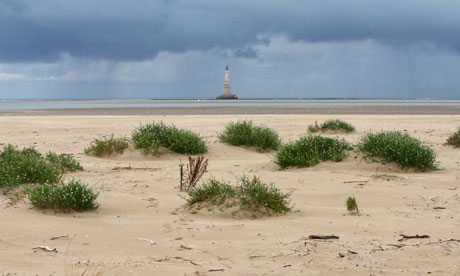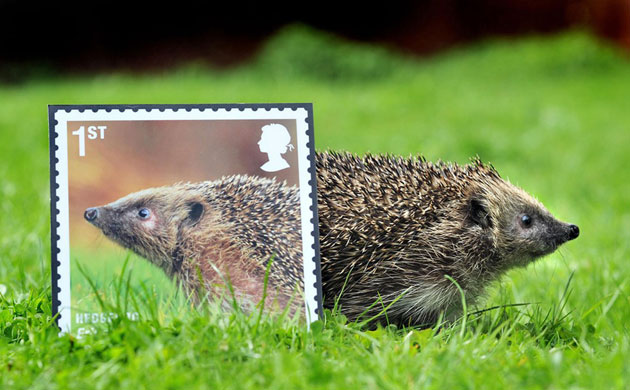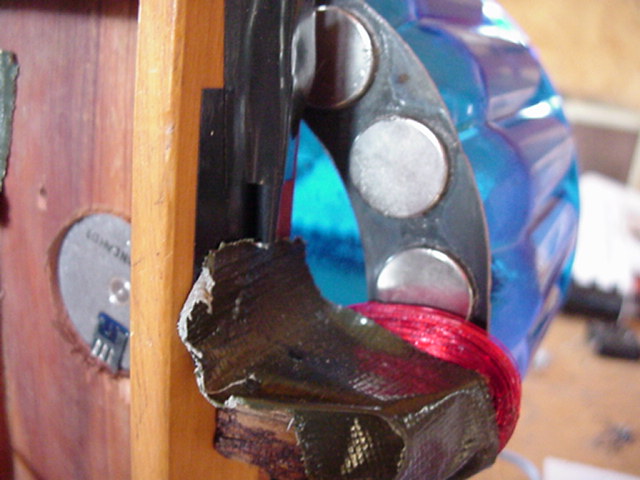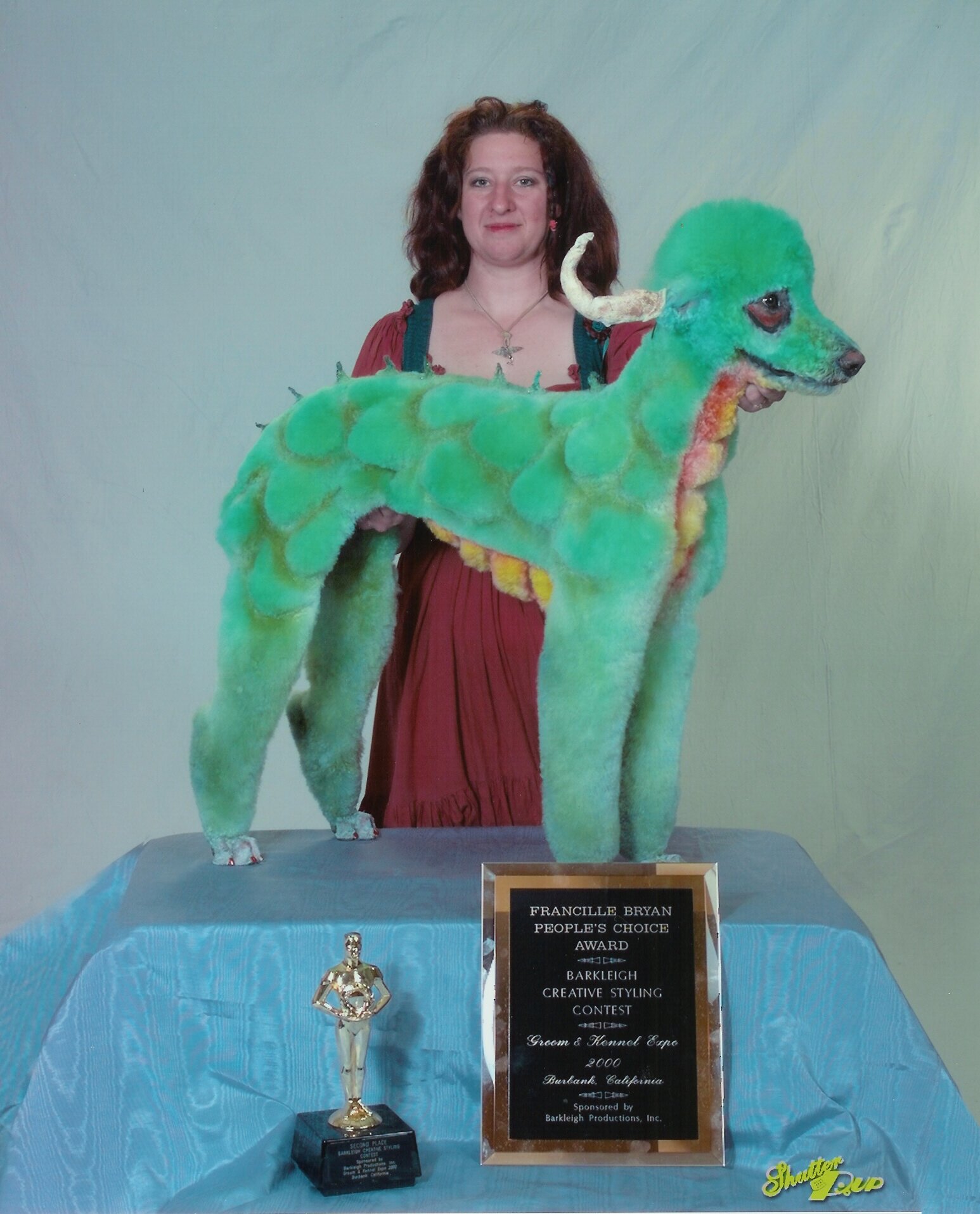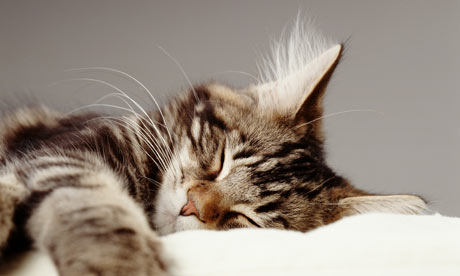http://www.guardian.co.uk/global/2010/sep/12/pets-battersea-dogs-home-animal-welfare-animals
Furry, four-legged, faithful and full of fun… It's no wonder many of us prefer our pets to our partners. But why have we become such a petcentric nation? As Battersea Dogs & Cats Home celebrates its 150th anniversary, we examine the changing role of animals in our lives
Tuesday, September 14, 2010
Tuesday, September 7, 2010
very nice hedge
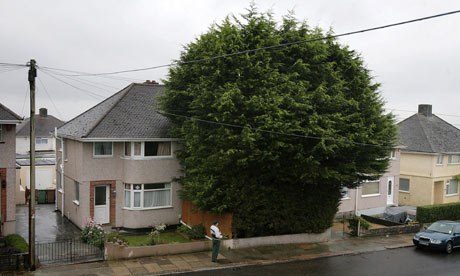
http://www.guardian.co.uk/uk/2010/sep/06/huge-leylandii-plymouth-dispute
Neighbours are objecting to the giant leylandii trees David Alvand has grown in his front garden to maintain his privacy
Please . Somebody . Get rid of this man!
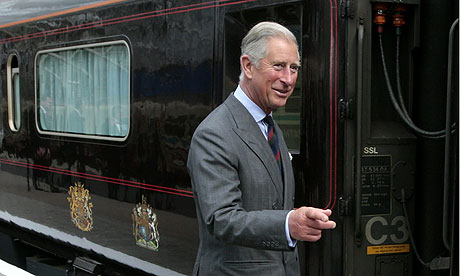
http://www.guardian.co.uk/uk/2010/sep/06/prince-charles-green-train-campaign
Eight carriages for a core party of 14 people to preach a message of sustainability on week-long tour of Britain
Thursday, August 19, 2010
Wednesday, August 18, 2010
Micro pig farm gets ad ban for pet that's not so wee wee wee
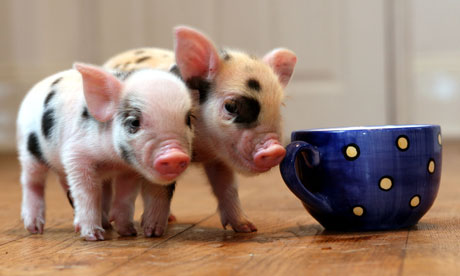
http://www.guardian.co.uk/world/2010/aug/18/micro-pig-advertising-ban-asa
Micro pigs may be the £700 accessory du jour for celebrities including Victoria and David Beckham, but there is a catch: they may not remain micro. An advertisement from a leading breeder has been banned after experts queried a claim that the pigs would not grow beyond pint-size.
The complaints centred on advertising claims by the Cambridgeshire-based Little Pig Farm, a purveyor of pampered micro pigs billed as getting "a big cuddle each and every day", with Classic FM piped through to their bedrooms.
Thursday, August 12, 2010
Wednesday, August 11, 2010
Thursday, July 29, 2010
Farmland bird numbers in England fall to record low
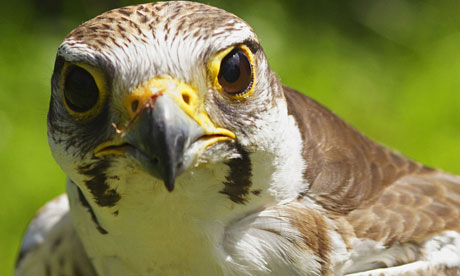
http://www.guardian.co.uk/environment/2010/jul/29/farmland-birds-record-low
The figures for England are based on the annual breeding birds survey by the British Trust for Ornithology, in which volunteers check 3,200 randomly selected 1km squares around the UK twice each year. But other data is included in the index published by environment department Defra, which makes figures for species decline slightly different. These figures are not yet online.
Thursday, July 22, 2010
Wednesday, July 21, 2010
Tuesday, July 6, 2010
Curious liaisons: Nature's weirdest sex lives

http://www.newscientist.com/article/mg20727671.100-curious-liaisons-natures-weirdest-sex-lives.html?DCMP=OTC-rss&nsref=online-news
ONCE upon a time, sex in the animal kingdom seemed pretty simple. Flamboyant male met coy female, male courted female, male deposited spermatozoa in the vicinity of an ovary, then headed out to do it all again elsewhere.
Then biologists began to look more closely, at what really happens. They found that being the biggest and brashest male doesn't always win you mating rights. Among weaver fish, for example, it is good fathers, the ones who will take care of the fry, who get the girl. Females don't always conform to type either. The female bean weevil, for instance, would rather drink her mate's ejaculate than use it to fertilise her eggs. Reproduction, it turns out, is a complex affair.
Sunday, June 13, 2010
Defra - Rural Definitions
http://www.defra.gov.uk/evidence/statistics/rural/rural-definition.htm
The Rural Definition - Summary
The Rural Definition was introduced in 2004 as a joint project between the Commission for Rural Communities (CRC - formerly the Countryside Agency), the Department for Environment, Food and Rural Affairs (Defra), the Office for National Statistics (ONS), the Office of the Deputy Prime Minister (ODPM) and the Welsh Assembly. It was delivered by the Rural Evidence Research Centre at Birkbeck College (RERC).
The Rural Definition - Summary
The Rural Definition was introduced in 2004 as a joint project between the Commission for Rural Communities (CRC - formerly the Countryside Agency), the Department for Environment, Food and Rural Affairs (Defra), the Office for National Statistics (ONS), the Office of the Deputy Prime Minister (ODPM) and the Welsh Assembly. It was delivered by the Rural Evidence Research Centre at Birkbeck College (RERC).
Tuesday, June 8, 2010
Religion's regressive hold on animal rights issues
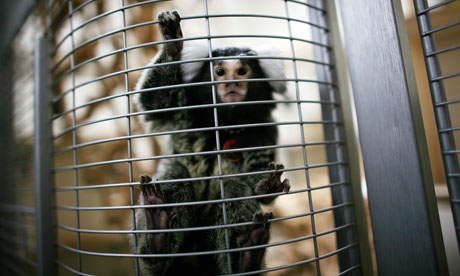
How are we to promote the need for improved animal welfare when battling religious views formed centuries ago?
http://www.guardian.co.uk/commentisfree/2010/jun/08/religion-regressive-hold-on-animal-rights
Last week, the chief minister of Malacca, Mohamad Ali Rustam, was quoted in the Guardian as saying that God created monkeys and rats for experiments to benefit humans. Activists had been protesting against his approval of an Indian company's proposal to build an animal research laboratory in his state. They said that Malaysia has no regulations to protect animals in laboratories. His answer was the reference to God's purpose in creating animals.
If it were not for the dire consequences for the animals who will suffer in the laboratory, the chief minister's remark would be hilarious. Here is the head of a Malaysian state justifying the establishment of a scientific enterprise with a comment that flies in the face of everything science tells us. The belief that the animals exist because God created them – and that he created them so we can better meet our needs – is contrary to our scientific understanding of evolution and, of course, to the fossil record, which shows the existence of non-human primates and other animals millions of years before there were any human beings at all.
Sunday, June 6, 2010
Sydney Opera House holds concert specifically for canine
Hundreds of dogs and their owners have descended on the Sydney Opera House for a concert specifically for canines.
Organisers say the event, the work of American musician and artist Laurie Anderson, is the first of its kind.
Ms Anderson called it "an inter-species social gathering on a scale never seen before in Australia".
http://news.bbc.co.uk/1/hi/world/asia_pacific/10246438.stm
Organisers say the event, the work of American musician and artist Laurie Anderson, is the first of its kind.
Ms Anderson called it "an inter-species social gathering on a scale never seen before in Australia".
http://news.bbc.co.uk/1/hi/world/asia_pacific/10246438.stm
Wednesday, June 2, 2010
Most Endangered Species in Britain
Top 10 most endangeered species in britain, according the the independent
http://www.independent.co.uk/environment/the-10-most-endangered-species-in-britain-414113.html
http://www.independent.co.uk/environment/the-10-most-endangered-species-in-britain-414113.html
Sunday, May 23, 2010
French farmers bring rural reality to Champs Elysées

http://www.guardian.co.uk/world/2010/may/23/french-farmers-champs-elysees
As the busiest, most traffic-friendly road in the French capital, there is usually very little that is field-like about the Champs Elysées, or Elysian Fields.
Today, however, the cars that usually speed through the famous avenue were brought to a halt and the cobblestones paved over with grass as la France profonde took over the most urban landscape in the country.
By bringing in 8,000 plots of earth and 150,000 plants to the city and installing them, amid sheep and cattle, along three-quarters of a mile of the thoroughfare, struggling farmers are attempting to highlight an aspect of French life which they believe is too often overlooked by Paris.
Friday, May 21, 2010
UN biodiversity report calls for global action to prevent destruction of nature
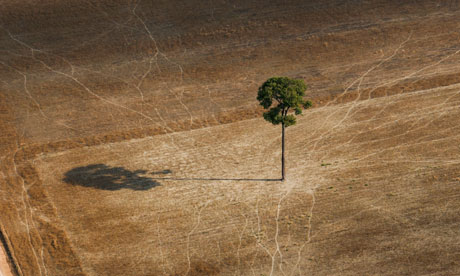
http://www.guardian.co.uk/environment/2010/may/21/un-biodiversity-economic-report
The economic case for global action to stop the destruction of the natural world is even more powerful than the argument for tackling climate change, a major report for the United Nations will declare this summer.
The Stern report on climate change, which was prepared for the UK Treasury and published in 2007, famously claimed that the cost of limiting climate change would be around 1%-2% of annual global wealth, but the longer-term economic benefits would be 5-20 times that figure.
The UN's biodiversity report – dubbed the Stern for Nature – is expected to say that the value of saving "natural goods and services", such as pollination, medicines, fertile soils, clean air and water, will be even higher – between 10 and 100 times the cost of saving the habitats and species which provide them.
Wednesday, May 19, 2010
Honeybees: 3D images reveal life inside a live hive

http://news.bbc.co.uk/earth/hi/earth_news/newsid_8682000/8682842.stm
Scientists have devised a new way to peer into the inner workings of a live honeybee colony, without disturbing the insects inside.
Sunday, May 16, 2010
Cannes film festival review – Over Your Cities Grass Will Grow
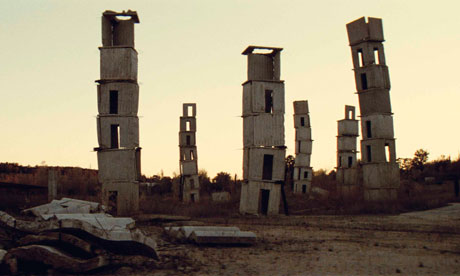
http://www.guardian.co.uk/film/2010/may/16/over-your-cities-grass-will-grow
Sophie Fiennes has directed an intriguing, near-wordless documentary about the work of industrial artist Anselm Kiefer
Building almost from the ground up in a derelict silk factory, Kiefer devised an artistic project extending over acres: miles of corridors, huge studio spaces with ambitious landscape paintings and sculptures that correspond to monumental constructions in the surrounding woodland, and serpentine excavated labyrinths with great earthy columns that resemble stalagmites or termite mounds. Nowhere is it clear where the finished product definitively stands; perhaps it is all work in progress, a monumental concept-art organism.
Thursday, May 13, 2010
Confronting the biodiversity crisis

In 2002, the world's governments agreed to significantly slow the rate of biodiversity loss by 2010. Time is almost up, and by most accounts they've failed. Now that climate change is emerging as one of biodiversity's greatest threats, scientists are proposing new ways to tackle the crisis. Hannah Hoag reports.
http://www.nature.com/climate/2010/1005/full/climate.2010.38.html
Tuesday, May 11, 2010
Calls for zoo closures after rare Siberian tigress found drowned
http://www.independent.co.uk/news/uk/home-news/calls-for-zoo-closures-after-rare-siberian-tigress-found-drowned-1954211.html
Campaigners have called for the phased closure of zoos after a Siberian tiger used for breeding purposes was found drowned in the enclosure of a zoo in Norfolk.
"There are so few cases where captive animals have been bred and brought back into the wild with success. Each time a situation like this occurs, it needs to be thoroughly investigated so that the public are made aware of the actual circumstances of the death and the necessity of the zoo – not be automatically led down the route of conservation. Zoos do not have a valid role any more. They are there purely for education purposes or a day out."
The comments mirror those of Angela Smith, the charities minister, who earlier this month denounced the concept of zoos, describing them as "relics of the Victorian era". Arguing that while certain venues "tried very hard", it was necessary to address the issue of animal welfare. Her comments were dismissed as "naive" by zoo managers while the Government announced that it had no plans to close any premises.
Campaigners have called for the phased closure of zoos after a Siberian tiger used for breeding purposes was found drowned in the enclosure of a zoo in Norfolk.
"There are so few cases where captive animals have been bred and brought back into the wild with success. Each time a situation like this occurs, it needs to be thoroughly investigated so that the public are made aware of the actual circumstances of the death and the necessity of the zoo – not be automatically led down the route of conservation. Zoos do not have a valid role any more. They are there purely for education purposes or a day out."
The comments mirror those of Angela Smith, the charities minister, who earlier this month denounced the concept of zoos, describing them as "relics of the Victorian era". Arguing that while certain venues "tried very hard", it was necessary to address the issue of animal welfare. Her comments were dismissed as "naive" by zoo managers while the Government announced that it had no plans to close any premises.
RADIOLARIAN SOFA BY LAZERIAN STUDIO

http://mocoloco.com/archives/013716.phpCorrugated cardboard furniture inspired by wasps' nests and sea organisms are the latest releases from Lazerian Studio. The Bravais Armchair and Radiolarian Sofa were produced for Interiors 2010 in Birmingham.
Saturday, May 8, 2010
Thursday, May 6, 2010
Trufa by Anton García-Abril
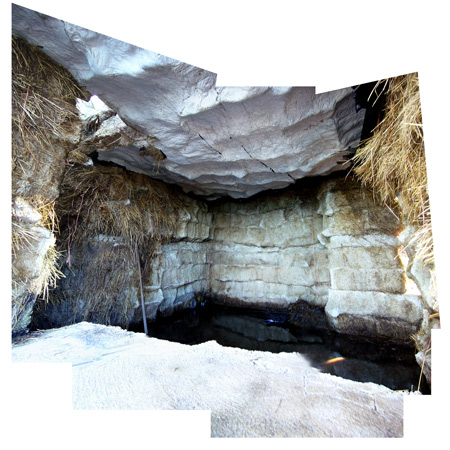
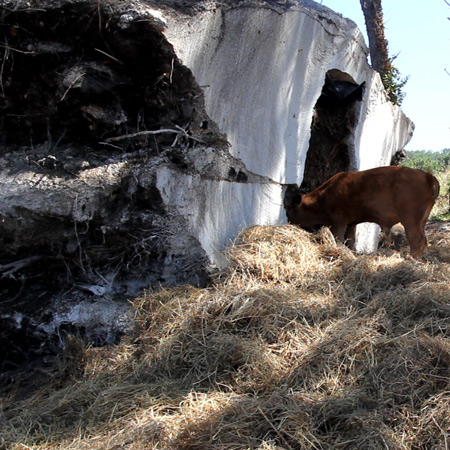
http://www.dezeen.com/2010/04/27/trufa-by-anton-garcia-abril/
Called Trufa (Truffle), the project involved pouring concrete over hay bales stacked and burried inside soil from the surroundings.
Saturday, May 1, 2010
Darius, the world's largest Rabbit
http://video.uk.msn.com/watch/video/darius-the-worlds-largest-bunny-rabbit/2ggjdrcl
'Sir King Darius' has been confirmed as the world's largest rabbit. At four foot three he has taken the title from his mother Alice.
'Sir King Darius' has been confirmed as the world's largest rabbit. At four foot three he has taken the title from his mother Alice.
Wednesday, April 28, 2010
The smallest horse in the world?
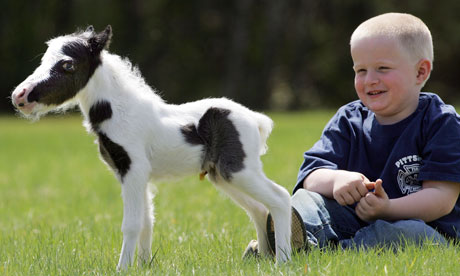
http://www.guardian.co.uk/world/blog/2010/apr/28/smallest-horse-in-the-world-einstein
When he was born in New Hampshire on Friday, young Einstein weighed just 6lb (2.7kg) and stood a mere 14-inches (35.5cm) tall. It is traditional to patronise small things by describing them as being pint-sized. Having spent some time cooing over this video of Einstein gambolling around his paddock to a rather charming bluegrass soundtrack, I have concluded he is at least two-litre-sized.
Friday, April 23, 2010
From Fable to Table

From Fable to Table
-----------------------------------
Our relationship to animals is contradictory. We can obsrve two opposite extremes :
> we love animals, nurture them, name them and share our daily life with them. In some extreme scenario, we treat them like human beings.
> we eat animals. We dissassociate the living creature from the meat. The animal is abstracted and becomes a functional material.
From Fable To Table is a series of hybride objects that confront us with a choice : nurturing an animal or killing it in order to eat it to fulfill our natural instinct. I chose the duck as the protagonist of my story because ducks are both easy to domesticate and very tasty.
http://www.amelieonzon.com/index.php?/fable-to-table/concept/
Tuesday, April 20, 2010
Iceland volcano: imagine a world without planes
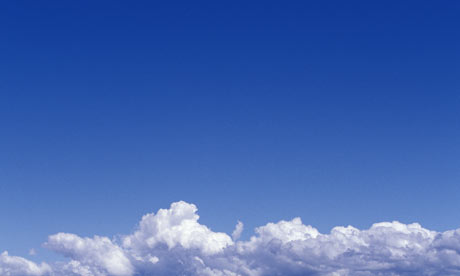
http://www.guardian.co.uk/world/2010/apr/20/iceland-volcano-world-without-planes
Cities would become foreign again, rather than mere simulacra of each other. Instead of being all-but indistinguishable from Birmingham, Bangalore would become exotic anew. Picture the scene: after years of travelling by foot, taxi, ferry, elephant, rickshaw, space hopper, horse and circus strongman's shoulders, you would arrive over the brow of a hill and survey the majesty of the Bangalore cityscape below, sharing sheepish smiles with your fellow travellers. And then you would return home, laden with gifts from this newly distant city (silks, spices, call-centre headsets) for friends and relatives. They, for their part, would thank you for the presents and curse themselves for never having travelled abroad.
De Botton reckons that we take air travel too much for granted – like a neglected spouse whom we have long since failed to notice is still quite the pip. "How we would admire planes if they were no longer there to frighten and bore us," he writes. "We would stroke their steel dolphin-like bodies in museums, and honour them as symbols of a daunting technical intelligence and a prodigious wealth." Speak for yourself, Alain.
Back in Kew Gardens, there is no sign of Chris Moyles being flown in like an aid package to bereft Blighty any time soon. What bliss! Peace and quiet are things to revel in, even if not for much longer. It's so quiet that I hear an unseen bee, probably on its way to Vince Cable's apiary in nearby Richmond. That's my kind of air travel.
Monday, April 19, 2010
The methane makers

http://news.bbc.co.uk/1/hi/magazine/8329612.stm
The author of the 2006 Stern Review into the cost of climate change attacked the "enormous pressure" meat production puts on the world's resources and said people were becoming increasingly aware about "low carbon consumption".
Thursday, April 15, 2010
'Stak Block' is as Strong as Brick and Made From Rice Straw

http://www.trendhunter.com/trends/stak-block
Oryzatech has patents granted and pending on a manufacturing process that renders rice straw waste into sturdy, stackable construction blocks. Each ‘Stak Block’ can be locally-produced of 96% recycled carbon-sequestering content, making them LEED credit worthy when used in construction.
Tuesday, April 13, 2010
Sunday, April 4, 2010
Non-native animals cause rural problems, charity warns

http://news.bbc.co.uk/1/hi/uk/8602358.stm
A number of non-native mammal species are damaging the UK countryside by eating crops and threatening wildlife, a conservation charity has warned.
A report by the People's Trust for Endangered Species identified 14 problem species including rats, American mink and muntjac deer.
The trust said some of the creatures have been in the UK for so long, they are thought of as indigenous.
It said it was important to stop the extinction of native species.
Practical action
According to the report, two of the UK's fastest declining native species - the red squirrel and the water vole - which has declined by 90% - are under threat by mammals introduced by humans in the last two centuries.
Saturday, April 3, 2010
Eddie the dog Tribute
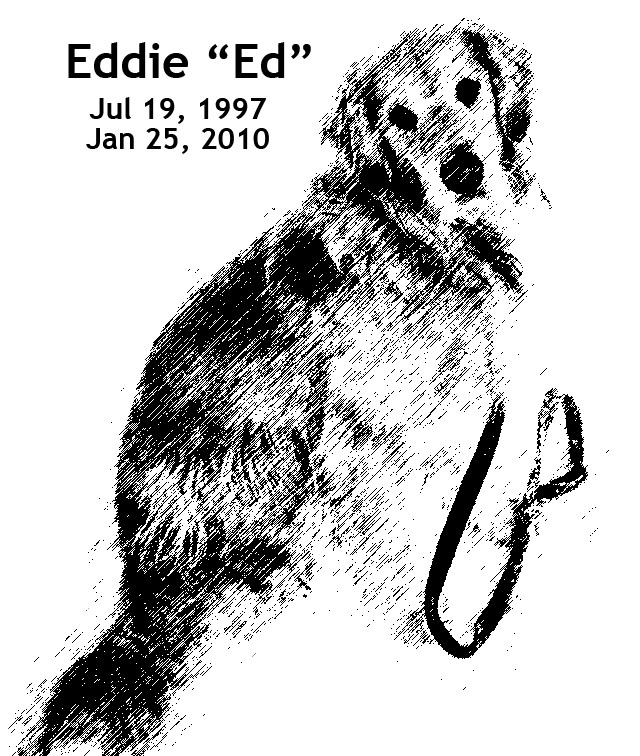
http://www.steephill.tv/2010/eddie-tribute/
February 5, 2010: We let Eddie go Monday night of last week (Jan 25th). A vet came by our house and put Eddie to sleep with dignity. Many of you have gone through the animal loss ordeal so you know the awful feeling.
Our house/ my office feels empty now and it is hard to believe that he is gone. We'll remember his love of life, people and daily dog walks. I figure I walked over 8000 miles with him and he kissed and touched the lives of countless thousands along the way. He was a real charmer. We'll also remember that sweet innocent look that belied his sneaky tactics, his graceful trot, his radiating energy and unspoken communication expressed through his eyes.
Friday, April 2, 2010
Mapping the Humanized World

http://www.wired.com/wiredscience/2007/11/mapping-the-hum/
http://www.eoearth.org/eoe-maps/gm/Anthromes/gmviewer.html
Researchers are proposing an incisive way of looking at ecological systems by including humanity’s reshaping of natural environments.
Read More http://www.wired.com/wiredscience/2007/11/mapping-the-hum/#ixzz0jxjQKtyZ
Wednesday, March 24, 2010
Bioluminescent Lamp Glows With The Power Of Hamster Cells
http://www.gizmodo.com.au/2010/03/bioluminescent-lamp-glows-with-the-power-of-hamster-cells/

Who needs a lamp to be classy when it can be fucking horrifying? That’s what the “Half Life” lamp is, because it glows thanks to living, genetically altered hamster cells that have been enriched with firefly genes. Holy shit.

Who needs a lamp to be classy when it can be fucking horrifying? That’s what the “Half Life” lamp is, because it glows thanks to living, genetically altered hamster cells that have been enriched with firefly genes. Holy shit.
Flexible Sheets Capture Energy from Movement

http://www.technologyreview.com/energy/24428/?a=f
Researchers at Princeton University have created a flexible material that harvests record amounts of energy when stressed. The researchers say the material could be incorporated into the soles of shoes to power portable electronics, or even placed on a heart patient's lungs to recharge a pacemaker as he breathes.
Hamsters in jackets harnessed for energy



Scientists have managed to harness the energy-producing power of hamsters by fitting them with tiny detector jackets.
It would take 1,000 hamsters to generate enough energy to power a mobile phone
Dr Zhong Lin Wang of Georgia University's Nano Research Group developed the flexible jackets, which are fitted with wires plugged into a nanogenerator that produces energy when they are bent and stretched.
"We believe that this is the first demonstration of a live animal producing current with nano-generators," she told The Sun.
Dr Wang added that the technology could be ready to be fitted into clothes within five years. It would capture energy produced not only when humans are active, but also from smaller movements such as when people are sat at computers.
http://www.telegraph.co.uk/science/4731679/Hamsters-in-jackets-harnessed-for-energy.html
http://www.abc.net.au/science/articles/2009/03/10/2511998.htm
http://gizmodo.com/122858/go+go-hamster-power
UN body to look at meat and climate link

http://news.bbc.co.uk/1/hi/sci/tech/8583308.stm
"Smarter animal farming, not less farming, will equal less heat," he told delegates to the American Chemical Society (ACS) meeting in San Francisco.
"Producing less meat and milk will only mean more hunger in poor countries."
Leading figures in the climate change establishment, such as Intergovernmental Panel on Climate Change (IPCC) chairman Rajendra Pachauri and Lord (Nicholas) Stern, have also quoted the 18% figure as a reason why people should consider eating less meat.
Apples and pears
The 2006 report - Livestock's Long Shadow, published by the UN Food and Agriculture Organization (FAO) - reached the figure by totting up all greenhouse-gas emissions associated with meat production from farm to table, including fertiliser production, land clearance, methane emissions from the animals' digestion, and vehicle use on farms.
The majority of the meat-related emissions come from land clearance and from methane emissions associated with the animals' digestion.
Other academics have also argued that meat is a necessary source of protein in some societies with small food resources, and that in the drylands of East Africa or around the Arctic where crop plants cannot survive, a meat-based diet is the only option.
Dr Mitloehner contends that in developed societies such as the US - where transport emissions account for about 26% of the national total, compared with 3% for pig- and cattle-rearing - meat is the wrong target in efforts to reduce carbon emissions.
Monday, March 22, 2010
Internet is biggest threat to endangered species, say conservationists
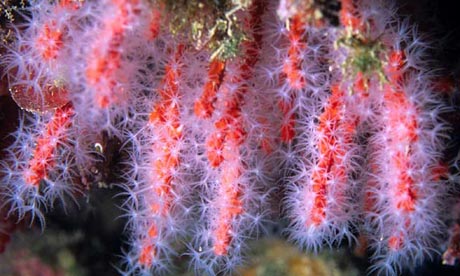
http://www.guardian.co.uk/environment/2010/mar/21/endangered-species-internet-threat
The internet has emerged as one of the greatest threats to rare species, fuelling the illegal wildlife trade and making it easier to buy everything from live lion cubs to wine made from tiger bones, conservationists said today.
The internet's impact was made clear at the meeting of the 175-nation Convention on International Trade in Endangered Species (Cites).
Delegates voted overwhelmingly today to ban the trade of the Kaiser's spotted newt, which the World Wildlife Fund says has been devastated by internet trade.
Sunday, March 21, 2010
German Architect Wants to Build World's Largest Artificial Mountain

The artificial mountain known as "The Berg" would provide a tourist landmark and skiing for Berlin
http://www.popsci.com/technology/article/2009-11/german-architect-wants-build-worlds-largest-artificial-mountain
If you're not sold on the awe-inspiring grandeur of this mountain, we'll let the "Berg manifesto" speak for itself -- and throw in some smack talk about other German cities in the bargain.
Hamburg, as stiff as fat, turns green with envy, rich and once proud Munich starts to feel ashamed of its distant Alp-panorama and planners of the Middle-East, experienced in taking the spell off any kind of architectural utopia immediately design authentic copies of the iconic Berlin-Mountain.
Perhaps something was lost in the translation there. Either way, we're looking forward to the next Bond movie where 007 rallies the neighborhood associations and fights a morass of city zoning laws to stop ... "The Berg."
Friday, March 19, 2010
Why everything you've been told about evolution is wrong
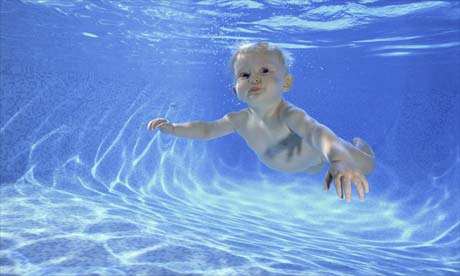
http://www.guardian.co.uk/science/2010/mar/19/evolution-darwin-natural-selection-genes-wrong
What if Darwin's theory of natural selection is inaccurate? What if the way you live now affects the life expectancy of your descendants? Evolutionary thinking is having a revolution . . .
Epigenetics suggests your lifestyle could affect the lifespan of your grandchildren
What does "nature" even mean if you can nurture the nature of your descendants?
Thursday, March 18, 2010
Birds nesting in building
Invisible University Library
Wynne Leung
Francesco Matteo Belfiore
University of Greenwich London UK
http://www.presidentsmedals.com/Project_Details.aspx?id=2187&dop=True&year=2008
Wynne Leung
Francesco Matteo Belfiore
University of Greenwich London UK
http://www.presidentsmedals.com/Project_Details.aspx?id=2187&dop=True&year=2008
Wednesday, March 17, 2010
Chinese zoo closed amid tiger starvation investigation
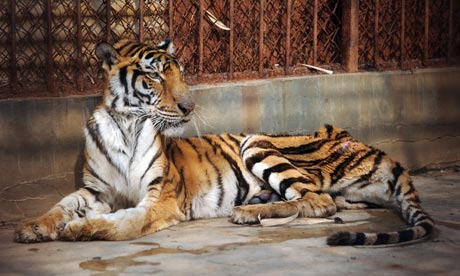
http://www.guardian.co.uk/world/2010/mar/17/chinese-zoo-tiger
Shenyang zoo has been closed after the deaths of 11 Siberian tigers and allegations of supplying the illegal tiger-bone trade
scandal-plagued Chinese zoo has been shut down after the starvation of 11 Siberian tigers and allegations that it has been illegally supplying brewers of tiger-bone tonics.
The authorities have launched an investigation into the Shenyang Forest Wildlife zoo, a semi-private operation that slashed rations for its animals after running into financial difficulties.
They will also examine the structural problems facing the country's massive captive-breeding business, in which – the Guardian has discovered – more than 1,000 other tigers are at risk of malnourishment. The Shenyang zoo, which is partly owned by local government, came into the spotlight after 11 Siberian tigers starved to death in the space of six months. It emerged that the keepers were feeding the animals cheap cuts of chicken because the zoo was short of money.
Thursday, March 11, 2010
England's threatened species by region
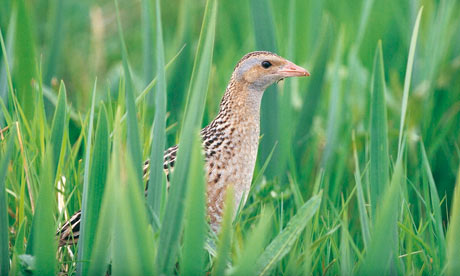
http://www.guardian.co.uk/environment/interactive/2010/mar/11/england-lost-threatened-species
http://www.guardian.co.uk/environment/2010/mar/11/extinct-species-england
More than two animals and plants a year are becoming extinct in England and hundreds more are severely threatened, a report published today reveals.
Natural England, the government's agency responsible for the countryside, said the biggest national study of threats to biodiversity found nearly 500 species that had died out in England, all but a dozen in the last two centuries.
Winners and losers
Going: Species facing "severe" threats in England
Red squirrel
Northern bluefin tuna
Natterjack toad
Common skate
Alpine foxtail
Kittiwake
Grey plover
Shrill carder bumblebee
Recovering: Recent conservation success stories
Pole cat
Large blue butterfly
Red kite
Ladybird spider
Pink meadowcap
Sand lizard
Pool frog
Bittern
Wednesday, March 10, 2010
LE CORBUSIER BINDS BOOK IN DEAD PET DOG

http://www.gravestmor.com/wp/archives/2006/01/11/le-corbusier-binds-book-in-dead-pet-dog/
This from the recently published book Le Corbusier: Architect of Books:
“He did bind one of his favourite books, Don Quixote, allegedly in leather made from the hide of one of his dogs, “Pinceau”, but the macabre bizzareness of such an act goes beyond the conventional fetishism of of lovers of fine books.”
Tuesday, March 9, 2010
Superefficient Frankencrops Could Put a Real Dent in Greenhouse Gas Emissions Read More http://www.wired.com/science/planetearth/magazine/16-06/ff_he
http://www.wired.com/science/planetearth/magazine/16-06/ff_heresies_06genetic?utm_source=feedburner&utm_medium=feed&utm_campaign=Feed:+wired/index+(Wired:+Index+3+(Top+Stories+2))&utm_content=Google+Reader
Keeping 6 billion people fed boosts global warming more than all the world's cars, trucks, trains, ships, and planes put together. Agriculture accounts for almost 14 percent of greenhouse gas emissions worldwide, according to the latest report from the Intergovernmental Panel on Climate Change. One response is to eat fewer of the two- and four-legged greenhouse gas factories known as animals. Before you send back that T-bone, though, call in the bioengineers.
Keeping 6 billion people fed boosts global warming more than all the world's cars, trucks, trains, ships, and planes put together. Agriculture accounts for almost 14 percent of greenhouse gas emissions worldwide, according to the latest report from the Intergovernmental Panel on Climate Change. One response is to eat fewer of the two- and four-legged greenhouse gas factories known as animals. Before you send back that T-bone, though, call in the bioengineers.
farming: Farmer set to produce Kobe beef in the North
http://findarticles.com/p/articles/mi_7997/is_2007_Sept_4/ai_n38616302/?tag=content;col1
IN his self-styled quest for the best, organic livestock farmer Steve Ramshaw has imported embryos of rare Wagyu cattle from Canada to produce the highly sought-after Kobe beef, probably the most expensive in the world.
Steve, of Monkridge Hill Farm, near Otterburn, will be one of the first farmers in the UK to produce the beef, which he hopes to start selling late next year through his meat marketing business, Northumbrian Quality Meats, to top restaurants, speciality food shops and his butcher's shop within the Fenwick food hall in Newcastle.
IN his self-styled quest for the best, organic livestock farmer Steve Ramshaw has imported embryos of rare Wagyu cattle from Canada to produce the highly sought-after Kobe beef, probably the most expensive in the world.
Steve, of Monkridge Hill Farm, near Otterburn, will be one of the first farmers in the UK to produce the beef, which he hopes to start selling late next year through his meat marketing business, Northumbrian Quality Meats, to top restaurants, speciality food shops and his butcher's shop within the Fenwick food hall in Newcastle.
Monday, March 8, 2010
Share Hair With the Animals
http://www.moonbattery.com/archives/2009/05/share_hair_with.html
A true environmentalist forms a symbiotic relationship with the other animals with whom humans share this Spaceship Earth. Hair can help reinforce reciprocal bonds.
Pet hair should not be discarded, but used to make environmentally friendly clothing:
Utilizing your pet's hair to make clothing, may seem a little bit odd, but it's a great way to get homegrown, green materials for a eco-friendly fur coat or sweater. Fur doesn't have to be murder. …
Pet Yarn Chic will spin your pet's hair into yarn for knitting.
You can buy a book about knitting with dog hair.
You can even learn how to gather pet hair, spin it into yarn and knit with it.
The finished products aren't that pretty, but they sure are functional and look quite warm.
You can share your own hair with the animal world…
…by leaving it out for the birds. This sounds crazy, but birds will build nests with your hair. …
A true environmentalist forms a symbiotic relationship with the other animals with whom humans share this Spaceship Earth. Hair can help reinforce reciprocal bonds.
Pet hair should not be discarded, but used to make environmentally friendly clothing:
Utilizing your pet's hair to make clothing, may seem a little bit odd, but it's a great way to get homegrown, green materials for a eco-friendly fur coat or sweater. Fur doesn't have to be murder. …
Pet Yarn Chic will spin your pet's hair into yarn for knitting.
You can buy a book about knitting with dog hair.
You can even learn how to gather pet hair, spin it into yarn and knit with it.
The finished products aren't that pretty, but they sure are functional and look quite warm.
You can share your own hair with the animal world…
…by leaving it out for the birds. This sounds crazy, but birds will build nests with your hair. …
NASA Tries Hair-Raising Idea
http://ipp.nasa.gov/innovation/Innovation64/hair.htm
RESEARCHERS AT NASA'S MARSHALL SPACE Flight Center in Huntsville are testing an Alabama hairdresser's hair-raising technique of using human hair to soak up oil spills. This could lead to a number of applications, including reducing landfill waste, saving costs in oil spill cleanups and recovering spilled oil for fuel.
RESEARCHERS AT NASA'S MARSHALL SPACE Flight Center in Huntsville are testing an Alabama hairdresser's hair-raising technique of using human hair to soak up oil spills. This could lead to a number of applications, including reducing landfill waste, saving costs in oil spill cleanups and recovering spilled oil for fuel.
Sunday, February 28, 2010
Whaling worsens carbon release, scientists warn

http://news.bbc.co.uk/1/hi/sci/tech/8538033.stm
A century of whaling may have released more than 100 million tonnes - or a large forest's worth - of carbon into the atmosphere, scientists say.
Whales store carbon within their huge bodies and when they are killed, much of this carbon can be released.
He pointed out that, particularly in the early days of whaling, the animals were a source of lamp oil, which was burned, releasing the carbon directly into the air.
"And this marine system is unique because when whales die [naturally], their bodies sink, so they take that carbon down to the bottom of the ocean.
"If they die where it's deep enough, it will be [stored] out of the atmosphere perhaps for hundreds of years."
Thursday, February 25, 2010
Relic reveals Noah's ark was circular
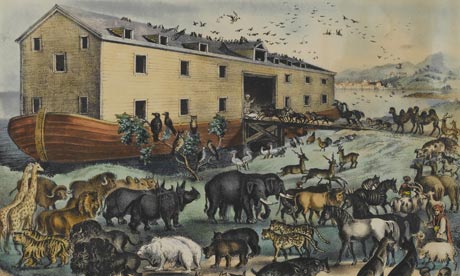
http://www.guardian.co.uk/uk/2010/jan/01/noahs-ark-was-circular
Finkel's research throws light on the familiar Mesopotamian story, which became the account in Genesis, in the Old Testament, of Noah and the ark that saved his menagerie from the waters which drowned every other living thing on earth.
In his translation, the god who has decided to spare one just man speaks to Atram-Hasis, a Sumerian king who lived before the flood and who is the Noah figure in earlier versions of the ark story. "Wall, wall! Reed wall, reed wall! Atram-Hasis, pay heed to my advice, that you may live forever! Destroy your house, build a boat; despise possessions And save life! Draw out the boat that you will built with a circular design; Let its length and breadth be the same."
Tuesday, February 23, 2010
Jonathan Safran Foer: the truth about fish farming
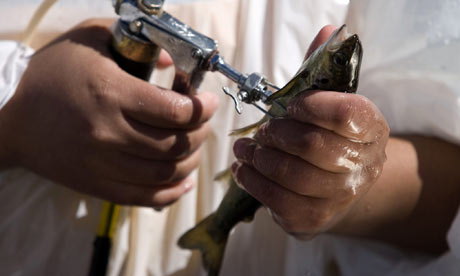
Although one can realistically expect that at least some percentage of cows and pigs are slaughtered with speed and care, no fish gets a good death. Not a single one. You never have to wonder if the fish on your plate had to suffer. It did.
http://www.guardian.co.uk/environment/2010/feb/23/jonathan-safran-foer-fish-farming
Thursday, February 18, 2010
Biomethane is an answer to road pollution, says rural watchdog
http://www.farminguk.com/news/Biomethane-is-an-answer-to-road-pollution,-says-rural-watchdog_17792.html
Tim Barnes-Clay,a Northamptonshire based motoring correspondent for the CLA’s national magazine, Land & Business, said: "Britain’s farmers can make biomethane from animal manures and crop by-products like vegetable peelings, as well as from crops such as maize. Compared to other biofuels, a car does many more miles per hectare running on biomethane - therefore making the best use of farmland.
Tim Barnes-Clay,a Northamptonshire based motoring correspondent for the CLA’s national magazine, Land & Business, said: "Britain’s farmers can make biomethane from animal manures and crop by-products like vegetable peelings, as well as from crops such as maize. Compared to other biofuels, a car does many more miles per hectare running on biomethane - therefore making the best use of farmland.
Thursday, February 11, 2010
Duke of Northumberland Estates
http://www.ft.com/cms/s/2/300924ae-0b94-11df-8232-00144feabdc0.html
http://www.dailymail.co.uk/property/article-1221409/Will-Dukes-grand-property-plans-ruin-villages-Northumberland.html
The Hilton comes to Syon Park
http://www.hounslowchronicle.co.uk/west-london-news/local-hounslow-news/2008/12/05/the-hilton-comes-to-syon-park-109642-22416150/
Property company Ability has already started work on the 13,000 square metre development
Rory Wilson, agent for The Northumberland Estates, which manages the Duke of Northumberland's business interests
Ability has promised to invest in the restoration and conservation of a number of Syon Park's most famous features, including the Adam oval carriageway in front of Syon House and the Duchess Gate, which will be reopened to pedestrians for the first time since the 1930s.
http://www.dailymail.co.uk/property/article-1221409/Will-Dukes-grand-property-plans-ruin-villages-Northumberland.html
The Hilton comes to Syon Park
http://www.hounslowchronicle.co.uk/west-london-news/local-hounslow-news/2008/12/05/the-hilton-comes-to-syon-park-109642-22416150/
Property company Ability has already started work on the 13,000 square metre development
Rory Wilson, agent for The Northumberland Estates, which manages the Duke of Northumberland's business interests
Ability has promised to invest in the restoration and conservation of a number of Syon Park's most famous features, including the Adam oval carriageway in front of Syon House and the Duchess Gate, which will be reopened to pedestrians for the first time since the 1930s.
Tuesday, February 9, 2010
Kew Gardens - Finances
Now Kew Gardens receives Government bailout as visitor numbers wither away
http://www.dailymail.co.uk/news/article-1188288/Now-Kew-Gardens-receives-Government-bailout-visitor-numbers-wither-away.html
A report from Kew's director Steve Hopper describes the organisation's finances as being of 'considerable concern'.
There are concerns over the future funding of the Millenium Seed Bank, a collection of seeds from around the world, including many of the most rare on the planet.
Mr Hopper adds: 'We have major heritage structures in a state of decay and we have no guarantee that the Millennium Seed Bank will be funded beyond 2010.
According to the Association of Leading Visitor Attractions, the World Heritage Site saw visitor numbers plummet by 8.5per cent to 1.3 million in 2008 as families reined in leisure spending and stayed at home.
'Approximately 50per cent of operating costs are met by Kew through commercial activities such as entry tickets, retail and catering.
http://www.dailymail.co.uk/news/article-1188288/Now-Kew-Gardens-receives-Government-bailout-visitor-numbers-wither-away.html
A report from Kew's director Steve Hopper describes the organisation's finances as being of 'considerable concern'.
There are concerns over the future funding of the Millenium Seed Bank, a collection of seeds from around the world, including many of the most rare on the planet.
Mr Hopper adds: 'We have major heritage structures in a state of decay and we have no guarantee that the Millennium Seed Bank will be funded beyond 2010.
According to the Association of Leading Visitor Attractions, the World Heritage Site saw visitor numbers plummet by 8.5per cent to 1.3 million in 2008 as families reined in leisure spending and stayed at home.
'Approximately 50per cent of operating costs are met by Kew through commercial activities such as entry tickets, retail and catering.
Saturday, February 6, 2010
Cat and dog population up by 4m
Sunday, January 24, 2010
Satellite Images of Farm Land

http://geology.com/nasa/farm-land/
Around the world, agricultural practices have developed as a function of topography, soil type, crop type, annual rainfall, and tradition. These images from NASA’s Terra satellite show differences in field geometry and size in different parts of the world. Each scene presented here covers an area of 10.5 by 12 kilometers. Images and captions by Earth Observatory.
Thursday, January 21, 2010
Random hamster

This project proposes to incorporate more meaningfully the life of hamsters, a pet usually kept marginalized in a cage, with the life of the family by making it play a significant role during a card game. Every time the hamster gives a spin in her wheel a random number is generated. This number is then used as a triggering event in the card game. According to certain rules defined in the game the hamster can also win a hand, in this case every participant must give her a peanut. The project leaves open the question either the hamster will learn by conditioning and will eventually alter the dynamic of the game. More information about the game and the whole process followed in this project can be seen in Maria Helena's blog. Programmed using the Arduino microcontroller. Code available here.
Cow farts collected in plastic tank for global warming study

http://www.telegraph.co.uk/news/newstopics/howaboutthat/2274995/Cow-farts-collected-in-plastic-tank-for-global-warming-study.html
Experts said the slow digestive system of cows makes them a key producer of methane, a potent greenhouse gas that gets far less public attention than carbon dioxide.
In a bid to understand the impact of the wind produced by cows on global warming, scientists collected gas from their stomachs in plastic tanks attached to their backs.
Wednesday, January 20, 2010
Subscribe to:
Posts (Atom)
